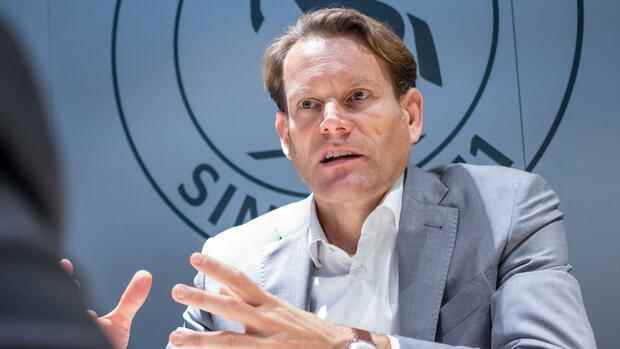The Continental boss continues to try to bring the core business back to profitability.
(Photo: dpa)
Dusseldorf The liberation does not come. Continental CEO Nikolai Setzer will most likely not be able to turn the automotive supplier’s core business into profitability in the 2022 fiscal year either. The division responsible for car components, sensors and software is Contis and Setzer’s problem child. The success of the group and the manager are measured by the car division.
At the annual general meeting, Setzer tries to exude confidence. “We have a clear strategy. We have the right structure,” says the CEO. But shareholders ask critical questions. “Why isn’t Continental gaining momentum?” asks the German Association for the Protection of Securities (DSW).
Last week, the supplier had to withdraw its outlook due to higher logistics and raw material costs as a result of the Ukraine war and the tough corona lockdowns in China. “In general, the supply chains and the raw material markets are very tense,” said Setzer. This year alone, the additional expenditure will be around 3.5 billion euros.
Conti tries to pass on part of the costs to the car manufacturers. “We are currently negotiating with our customers in order to make price adjustments in view of the current inflation,” explained Setzer. Regarding the supply of gas, which is also obtained from Russia, he said: “Basically, natural gas represents a significant proportion of Continental’s energy mix in Germany.”
Top jobs of the day
Find the best jobs now and
be notified by email.
The 51-year-old has been head of the third largest German automotive supplier after Bosch and ZF since 2020. After his predecessor Elmar Degenhart retired due to illness, Setzer moved to the top of the group earlier than expected. Degenhart has left Setzer with a difficult legacy.
Only half of the restructuring of the group has been implemented, ongoing diesel investigations were the undoing of the long-standing CFO Wolfgang Schäfer, and no synergies were leveraged in the car division for years. At the same time, the Conti boss had to manage the consequences of the corona pandemic and the chip crisis.
Heavy workload for typesetters
Since the beginning of the year, Setzer has also been solely responsible for the car division as CEO. The core business had previously been managed by the two long-standing Conti managers Helmut Matschi and Frank Jourdan.
The burden and task for typesetters could hardly be greater. The financial markets and employee representatives take note of this, but demand progress. Investors see great potential in individual company divisions, which from their point of view can only unfold if it is separated from the group as a whole. This includes, for example, the division for automated driving. The Handelsblatt had reported on the spin-off speculation.
According to Setzer, the automotive division is “even more clearly aligned with the market”. At the annual general meeting, he rejected plans to spin off the business for automated driving. However, “adjustments to the portfolio are possible”.
Time is against him. Because the workers on the tire side are growing impatient. From the tire employees’ point of view, the rubber business bears a large financial burden in the transformation of the core business. “The tire division has been financing a significant part of the restructuring of the automotive business for years,” a group expert recently told the Handelsblatt.
The third largest German automotive supplier is in a major restructuring process.
(Photo: dpa)
In the meantime, Setzer is trying to implement his formula for success in his core business. For years, the Conti boss was head of the tire division, which he successfully restructured. The current success of the tire business goes back to Setzer and his team.
Setzer has now gathered this team around him in the car division as well. In his tire time it was a “sworn team”. If this team does not deliver any significant results in two years, Setzer risks his reputation, according to supervisory board circles.
Despite the setbacks, Setzer is convinced of the strategy in the core business. The focus is on returning to profitability. “And we will achieve the goals in Automotive,” said Setzer at the Annual General Meeting. The Conti boss sees fewer operational deficits. Rather, from his point of view, the capital markets would not adequately value Conti in view of its technological capabilities.
However, Maria-Elisabeth Schaeffler-Thumann will no longer accompany this process as a member of the Supervisory Board. The 80-year-old is retiring from the committee. Supervisory Board Chairman Wolfgang Reitzle acknowledged the importance of Thumann-Schaeffler. “Ms. Schaeffler was a stroke of human luck. With her departure, an era for Continental comes to an end,” says Reitzle.
More: Imminent loss of status: How Germany’s automotive suppliers are fighting for their future business

